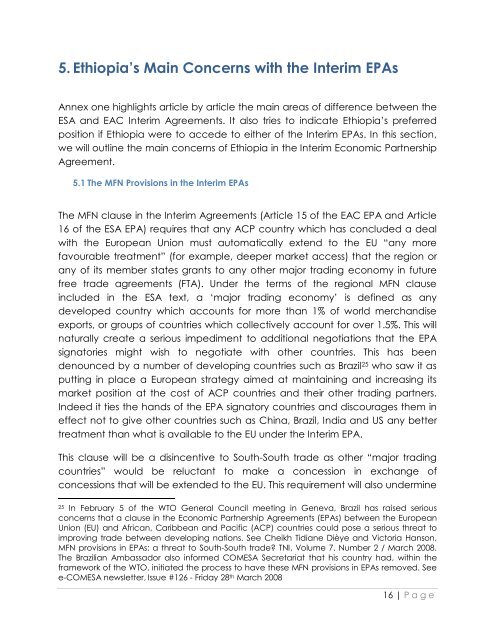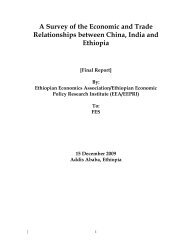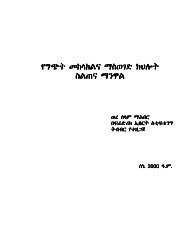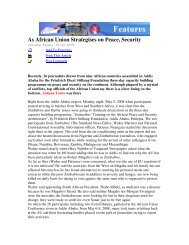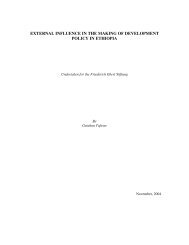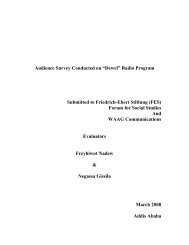Ethiopia and EPA Negotiation 2008 - FES Ethiopia
Ethiopia and EPA Negotiation 2008 - FES Ethiopia
Ethiopia and EPA Negotiation 2008 - FES Ethiopia
Create successful ePaper yourself
Turn your PDF publications into a flip-book with our unique Google optimized e-Paper software.
5. <strong>Ethiopia</strong>’s Main Concerns with the Interim <strong>EPA</strong>s<br />
Annex one highlights article by article the main areas of difference between the<br />
ESA <strong>and</strong> EAC Interim Agreements. It also tries to indicate <strong>Ethiopia</strong>’s preferred<br />
position if <strong>Ethiopia</strong> were to accede to either of the Interim <strong>EPA</strong>s. In this section,<br />
we will outline the main concerns of <strong>Ethiopia</strong> in the Interim Economic Partnership<br />
Agreement.<br />
5.1 The MFN Provisions in the Interim <strong>EPA</strong>s<br />
The MFN clause in the Interim Agreements (Article 15 of the EAC <strong>EPA</strong> <strong>and</strong> Article<br />
16 of the ESA <strong>EPA</strong>) requires that any ACP country which has concluded a deal<br />
with the European Union must automatically extend to the EU “any more<br />
favourable treatment” (for example, deeper market access) that the region or<br />
any of its member states grants to any other major trading economy in future<br />
free trade agreements (FTA). Under the terms of the regional MFN clause<br />
included in the ESA text, a ‘major trading economy’ is defined as any<br />
developed country which accounts for more than 1% of world merch<strong>and</strong>ise<br />
exports, or groups of countries which collectively account for over 1.5%. This will<br />
naturally create a serious impediment to additional negotiations that the <strong>EPA</strong><br />
signatories might wish to negotiate with other countries. This has been<br />
denounced by a number of developing countries such as Brazil 25 who saw it as<br />
putting in place a European strategy aimed at maintaining <strong>and</strong> increasing its<br />
market position at the cost of ACP countries <strong>and</strong> their other trading partners.<br />
Indeed it ties the h<strong>and</strong>s of the <strong>EPA</strong> signatory countries <strong>and</strong> discourages them in<br />
effect not to give other countries such as China, Brazil, India <strong>and</strong> US any better<br />
treatment than what is available to the EU under the Interim <strong>EPA</strong>.<br />
This clause will be a disincentive to South-South trade as other “major trading<br />
countries” would be reluctant to make a concession in exchange of<br />
concessions that will be extended to the EU. This requirement will also undermine<br />
25 In February 5 of the WTO General Council meeting in Geneva, Brazil has raised serious<br />
concerns that a clause in the Economic Partnership Agreements (<strong>EPA</strong>s) between the European<br />
Union (EU) <strong>and</strong> African, Caribbean <strong>and</strong> Pacific (ACP) countries could pose a serious threat to<br />
improving trade between developing nations. See Cheikh Tidiane Dièye <strong>and</strong> Victoria Hanson,<br />
MFN provisions in <strong>EPA</strong>s: a threat to South-South trade? TNI, Volume 7. Number 2 / March <strong>2008</strong>.<br />
The Brazilian Ambassador also informed COMESA Secretariat that his country had, within the<br />
framework of the WTO, initiated the process to have these MFN provisions in <strong>EPA</strong>s removed. See<br />
e-COMESA newsletter, Issue #126 - Friday 28 th March <strong>2008</strong><br />
16 | P a g e


